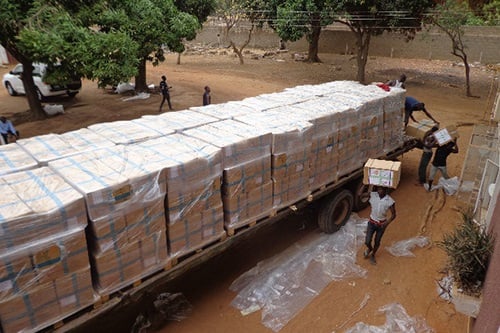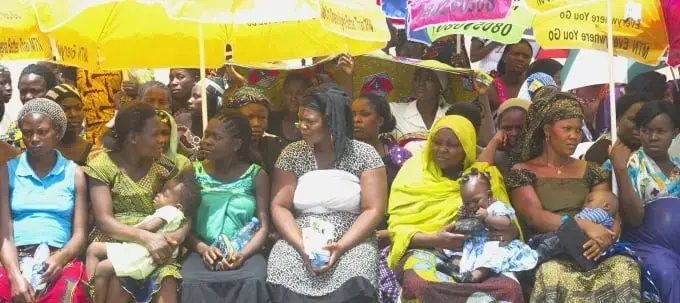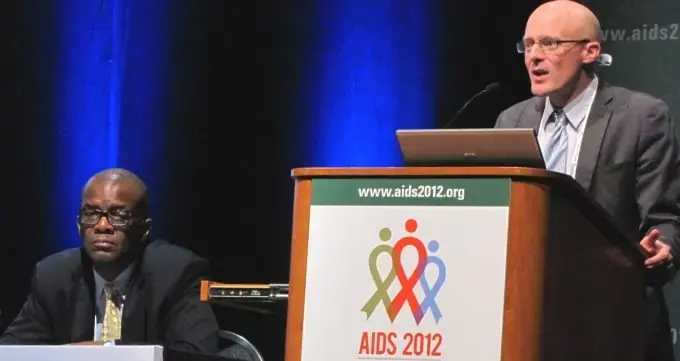Over 400 women and children held by Boko Haram extremists in Nigeria were reported to have been rescued by the country's army at the end of April. UNFPA Nigeria quickly moved to provide immediate support to the freed women and girls in Borno and Adamawa States, and is strengthening services in anticipation of additional freed hostages, as the military steps up its offensive against the insurgents.
UNFPA Nigeria, in collaboration with the Borno State Ministry of Health, is providing psychosocial support, post-rape and STI treatment and dignity kits to women and girls rescued from Boko Haram. Some of those rescued are in camps for internally displaced persons (IDPs). Clean delivery kits are available for safe delivery to prevent maternal or infant deaths.
Boko Haram has been active in north-eastern Nigeria for the past several years, abducting a large number of men, women and girls during this time – most notably, the group of 276 schoolgirls that was seized in Chibok just over a year ago. These victims have been subjected to forced labour, and sexual and psychological abuses, and have had to fight on the frontline alongside members of Boko Haram.
UNFPA responding to Chibok crisis right from start
UNFPA Nigeria has been responding to the crisis since its inception and has ensured appropriate personnel are in place (including a psychosocial support expert trainer) and that necessary supplies, including kits, are available to meet the physical, emotional, psychological and medical needs of the women and girls on arrival. The humanitarian response programme was scaled up in 2014 to cover six States. By the end of 2014, UNFPA Nigeria had distributed 21,800 clean delivery kits and 17,664 female dignity kits. As a result of these supplies, by the end of the year 16,350 women had safe deliveries in UNFPA-supported facilities across the six states. A total of 73 women with complications received comprehensive care, including Caesarian sections, at the supported referral centres. There were no maternal deaths.
 UNFPA’s reproductive health kits are received in northern Nigeria. The kits will strengthen sexual and reproductive health in the conflict-affected states. The kits were provided with funds from the Government of Japan. © UNFPA/Mustapha |
As part of the preparedness, some 121 health workers received training on providing psychosocial support. Sixty doctors, midwives and nurses were trained on minimum initial service packages for reproductive health in humanitarian settings. In addition, 60 health-care providers were trained on clinical management of rape and post-abortion management, and 50 midwives and nurses were trained on providing long-acting re-serviceable contraceptives, which enable these vulnerable women to avoid unintended pregnancies.
In total, more than 700 traumatized people, including the rescued women and girls, have received psychosocial support from trained health personnel at UNFPA-supported facilities at the camps for those displaced in Borno State.
Increased reporting of sexual violence
There was a significant increase in reporting of sexual violence, with 123 cases reported in security posts and 45 cases in health facilities in Adamawa and Borno State. This increase in reporting is associated with increased awareness of gender-based violence resulting from community sensitization sessions carried out in camps. Also, the increased availability of trained health personnel to provide services and supplies for treatment at the camp clinics have strengthened the health systems for the continuous provision of sexual and reproductive health services in the Northeast.
With last week’s influx of rescued women and girls, including the 293 women and girls who were rescued on Tuesday 28 April, UNFPA in close collaboration with Borno State Ministry of Health has further stepped up its support. The trained health workers were mobilized and deployed within 24 hours to the camps where they were able to provide psychosocial support counselling to the traumatized women and girls and make referrals for the most complicated cases among them.
The majority of the rescued girls who were counselled are pregnant. Additional reproductive health (RH) kits and dignity kits were deployed immediately to Borno and Adamawa States. “Our level of preparedness enabled us to respond almost immediately,” said Ratidzai Ndhlovu, the UNFPA Representative in Nigeria. “We do not select which rescued girl to support but we support all girls, including the Chibok girls, because in UNFPA, everyone counts," she said.
UNFPA Nigeria is preparing to extend its support even further as more women and girls are expected to be rescued in the coming days and weeks, as the Nigerian military escalates its offensive to end the Boko Haram insurgency.




